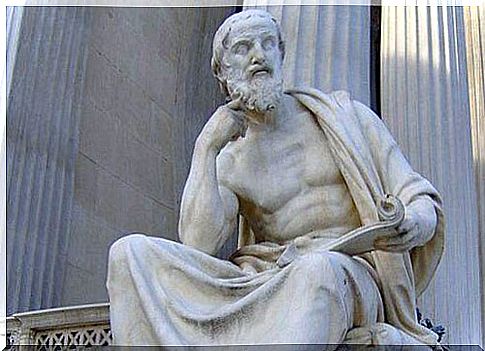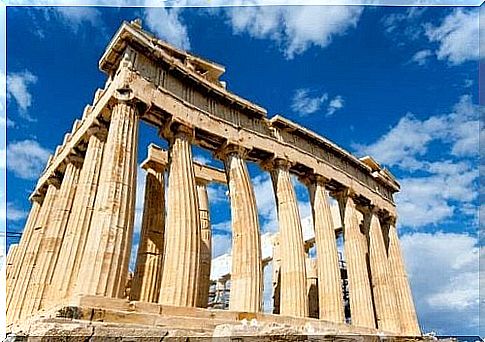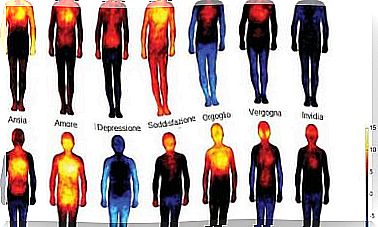Herodotus, First Historian And Anthropologist

Herodotus of Halicarnassus was a historian and geographer of ancient Greece, who lived between 484 and 425 BC. Nowadays he is considered by many to be the father of history and by some also the first anthropologist.
He was the first historian to hand down a reasoned and structured record of human events and actions. To do this, he consulted a wide variety of historical sources, both oral and written. As we shall see, Herodotus was a forerunner of his times.
The history lesson of Herodotus
The nine books of the Stories represent the first Western historiographical work that has come down to us in its entirety. The work has two main objectives:
- Preserve the memory of the events experienced by the Greeks and the barbarians.
- Find and explain the causes of these events and the effects on the Greek and Persian people.

The events recorded by Herodotus focus on the Persian wars (492-478 BC). Conflicts that saw the Persian Empire and Greece as protagonists, even if, often, they tend to deviate from the main topic.
The events are expressed in prose, thus moving away from the writing style of Homer (author of the Iliad and the Odyssey ) which had an evident influence on Herodotus. However, it retains some characteristics such as third-person narration, the use of formal and elevated language and the commemoration of events and characters in order to avoid oblivion.
Another major difference between epic poetry and Herodotus’ historiography is the sources of information. While Homer’s main source of inspiration was the Muse, Herodotus began a process of gathering information. His goal was to elaborate his narratives with continuity and a certain historical sense.
Herodotus, the historical traveler
Due to his great curiosity, Herodotus was also a great traveler. He wrote about everything he saw and heard on his travels. This is clearly reflected in the method of collection of sources used to carry out his great historical work, and which consisted of the following points:
- Research and gathering of information on what could be seen directly. He used the descriptions of the geographical aspects, the most common customs of the cities visited and their most surprising peculiarities.
- When he was unable to gather information directly, he used the oral testimonies of the natives of the places he visited.
- He consulted written sources produced by epic poets and logographers.
Throughout his work, Herodotus explains how and from where he extracts the information he uses to recount an event. It reveals the importance and the difficulty of using the different sources in order to make the historical account as faithful as possible. This use of direct, oral and written sources is what made his style a milestone. In fact, marking a before and after in historiographic production.
The nine books of the Stories
His long work, Stories , is divided into 9 volumes. Each with their own topics, places and events:
- In the first book he exposes the possible causes of the Persian Wars. It mainly speaks of the reign of Lydia in the time of King Croesus. According to the historian, he was the first aggressor and instigator of the conflicts between Greece and Persia.
- In the second book he talks about Egypt and its great wonders. The author describes the relevant geographical aspects and the most important Egyptian customs. It also makes a summary of the country’s long history.
- The third book exposes the causes that led the Persian Cambyses to attack Egypt with the aim of conquering it. It develops with the account of the military campaign and the personality of Cambyses and ends with his death and the accession to the throne of Darius I.
- The fourth book consists of two sections. The first concerns Scythia (Central Asian region) and the second Libya.
- From the fifth to the ninth book, Herodotus focuses on the war between the Greeks and the Persians. The fifth deals with the advance of the Persian army in Greece, in particular in Macedonia and Thrace. It also talks about the history, geography and culture of Sparta and Athens, as they are affected by the conflict. The sixth book deals with Darius ‘s expedition, which ended with the Greek victory at Marathon. In the seventh book he faces a series of dramatic battles, such as that of Thermopylae. Finally, the eighth and ninth books deal respectively with the battles of Salamis and Plataea.
The first historian and anthropologist
For the use of methods of collecting sources and his long historical work, Herodotus is considered by many of the current historians to be the father of history. Thanks to the descriptions of the events experienced during his travels, we have an account of one of the conflicts that have marked a large part of Europe and ancient Asia. Descriptions supported by visual, oral and documentary references and not simply by the author’s imagination.
However, he is not only considered the first historian, but also the first anthropologist. This is due to his use of participatory observation, a fundamental characteristic of what is now known as the ethnographic method, and to his great interest in the habits and customs of peoples who were not Greeks.









